Monitoreo y evaluación
La mayoría de desafíos de Monitoreo y Evaluación (MyE), tales como la falta de capacidades e inversión suficiente, no son específicos de los PTM. Sí los son aquellos que se refieren principalmente al monitoreo de los resultados de las transferencias sin restricciones. La flexibilidad de las transferencias en efectivo puede hacer que sea difícil determinar los indicadores de resultado apropiados, ya que ello puede implicar una combinación de indicadores sectoriales e intersectoriales. Al mismo tiempo, existen limitaciones en la recopilación de datos precisos sobre cómo se gastan las transferencias en efectivo.
Los firmantes del Gran Pacto se han comprometido a garantizar que existan mecanismos pertinentes de MyE para la asistencia en efectivo, y a incrementar el conocimiento de los costos, beneficios, impactos y riesgos de la misma en relación con otras modalidades. Sobre esta base, el grupo de trabajo del Gran Pacto sobre asistencia en efectivo dispone de puntos de acción, incluida la elaboración de indicadores de resultado comunes para el efectivo multipropósito, y métricas para el análisis del valor por dinero. El análisis sistemático del valor por dinero ha sido limitado por factores como la falta de criterios convenidos, la necesidad de datos de resultados de calidad y la naturaleza intensiva de los análisis.
Prioridades actuales
Como parte de los compromisos del Gran Pacto, la CALP Network ha coliderado con USAID y el Catholic Relief Service (CRS, por sus siglas en inglés) el desarrollo de indicadores de resultado de transferencias monetarias multipropósito. El borrador para prueba se encuentra disponible actualmente en inglés, francés y español en la biblioteca de CALP Network.
Iniciativas relacionadas
Contenido destacado

Multipurpose Cash Outcome Indicators – Final Draft for Testing
Guidelines and Tools
Note that the MPC indicators have now been revised. Please click here to access the updated Multipurpose Outcome Indicators and Guidance, which is available in Arabic, English, French and Spanish. Multipurpose Cash Outcome Indicators – Final Draft for Testing Multipurpose cash (MPC) is a type of assistance intended to enable people to meet their basic needs through local...

Monitoring 4 CTP: Monitoring Guidance for CTP in Emergencies
Guidelines and Tools
This guidance provides a central resource to promote a common understanding of the most important monitoring considerations for humanitarian projects using cash transfer programming (CTP). The primary audience for this guidance is field-level practitioners, from organisations directly involved in the design, implementation, monitoring, and accountability of projects using cash and vouchers...

Cost-Efficiency Analysis of Basic Needs Programs: Best Practice Guidance for Humanitarian Agencies
Guidelines and Tools
The Efficiency, Effectiveness and Value for Money Sub-Workstream is pleased to share the final output on Cost-Efficiency Analysis of Basic Needs Programs: Best Practice Guidance for Humanitarian Agencies (attached).
Cost-efficiency analysis estimates the ratio of program costs to outputs created, allowing you to compare cost-per-output for programs which all produced the same output. Such...
Líder temática
Últimos recursos

Review of Food for Peace Market-Based Emergency Food Assistance Programs: Sierra Leone Case Study Report
Report
Sierra Leone represents a remarkable experiment in market-based emergency programming using unconditional cash transfers and some conditional cash transfers Sierra Leone reflects the challenges of providing food assistance in the wake of a major infectious disease epidemic. Food insecurity increased due...
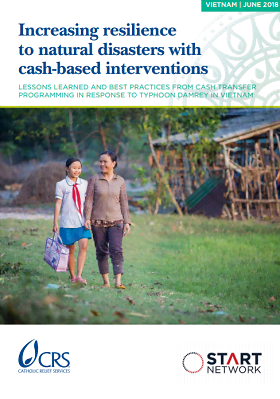
Increasing resilience to natural disasters with cash-based interventions
Report
This report presents recommendations for the ongoing development and improvement of CTP in emergency preparedness and response in Vietnam. It is hoped that these best practices, lessons learned and recommendations will contribute to the wider global discussions on the use and impact of CTP to increase...
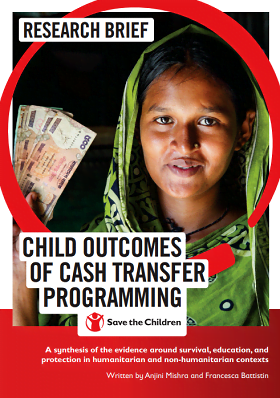
Child Outcomes of Cash Transfer Programming: Research Brief
Report
Humanitarian emergencies are increasing in both frequency and duration. It is evident that children bear the brunt of these situations and that these experiences have long-lasting effects on their development and future. The figures for the number of children affected by humanitarian emergencies are...

Assessment of the Geographical and Community-based Targeting of WFP’s Cash and Food for Assets Programme in Kenya
Report
This report provides an in-depth assessment of the targeting mechanisms used for the cash and food for assets programme by the World Food Programme (WFP) and the National Drought Management Authority (NDMA). Assessment of the Geographical and Community-based Targeting of WFP’s Cash and Food for Assets...

Review of Food for Peace Market-Based Emergency Food Assistance Programs: Zimbabwe Case Study Report
Report
Zimbabwe reflects the recent Southern African drought crisis during a period of a regional El Niño-related drought and a national cash crisis. The United States Agency for International Development (USAID) Office of Food for Peace (FFP) funded a mix of programming between fiscal years 2011 and 2015,...

Child Outcomes of Cash Transfer Programming: Appendix 1
Report
This is an appendix to the document “Research brief: Child outcomes of cash transfer programming. A synthesis of the evidence around survival, education and protection in humanitarian and non-humanitarian contexts”. This appendix contains the list of studies that were reviewed, with information on...

Transfer Values in Kenya’s National Social Security System
Report
This report, commissioned by the World Food Programme (WFP) and United Nations Children’s Fund (UNICEF) seeks to examine the current transfer values of Kenya’s tax-financed social security schemes and assess whether they are set at an appropriate level. Transfer Values in Kenya’s National Social...
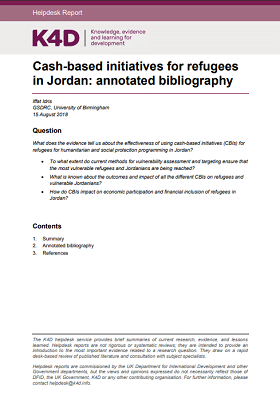
Cash-Based Initiatives for Refugees in Jordan: Annotated Bibliography
Report
The available literature tells us little about the effectiveness of targeting of cash-based initiatives (CBIs) for refugees in Jordan. However, it suggests there are positive impacts on food security for refugees, their ability to pay for rent and utilities and their psycho-social well-being, as well as...

Child Outcomes of Cash Transfer Programming: Appendix 2
Report
This is an appendix to the document “Research brief: Child outcomes of cash transfer programming. A synthesis of the evidence around survival, education and protection in humanitarian and non-humanitarian contexts”. This appendix contains a summary of the available evidence per each outcome of...

Child Vulnerability and Social Protection in Kenya
Report
Kenya’s Social Protection Secretariat has highlighted new evidence showing the need for a universal child grant for Kenyan children. The evidence in Child Vulnerability and Social Protection in Kenya highlights that targeting social protection at orphans, 7.5% of Kenya’s children, with a Cash Transfer...
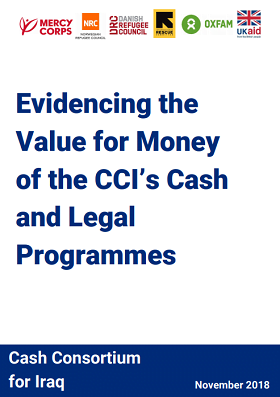
Evidencing the Value for Money of the CCI’s Cash and Legal Programmes
Report
Value for Money (VfM) considerations are an increasingly common requisite in humanitarian programmes. The UK’s Department for International Development (DFID) supports the adoption and scale-up of cash programming in humanitarian settings where appropriate, as both a more effective means for people to...

Cash-Based Programming in South Sudan
Report
This rapid review provides a synthesis of evaluations and learning reviews of cash-based programming in South Sudan. There is evidence that in South Sudan the cash-based programming help poor households address food needs and nutrition; and by injecting funds from vouchers, paid work, or grants into the...

Hygiene NFI Provision through Cash Assistance with E-Voucher Modality: PDM
Report
NCA & LWF Gure-shembola Refugee Camp CBI PDM report.

Social Accountability in the Delivery of Social Protection: Technical Guidance Note
Guidelines and Tools
How can citizens better hold social protection officials to account and ensure that they can understand their entitlements? Development Pathways’ research project on social accountability in social protection for the UK’s Department for International Development provides some answers. Social...

Reviewing the Linkages between Gender, Market Assessments and Market-based Interventions
Report
From ‘Collected Papers on Gender and Cash Transfer Programmes in Humanitarian Contexts’. Existing gender inequalities mean that disasters and conflicts impact women, men, girls and boys differently. Cash based assistance is one of the most significant developments in humanitarian assistance in recent...

Gure- Shembola Refugee camp E-vouchor pilot program- Learning Document
Report
Norwegian Church Aid (NCA) in partner with Lutheran World Federation (LWF) have been completed their project using CBI approach. The project was aimed to provide Gure Shembola refugees with access to their choice of hygiene items through an e-voucher system. This learning document aims to document the...
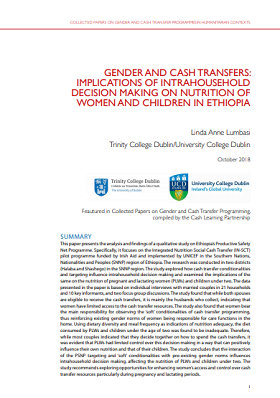
Gender and Cash Transfers: Implications of Intrahousehold Decision Making on Nutrition of Women and Children in Ethiopia
Case Study
From ‘Collected Papers on Gender and Cash Transfer Programmes in Humanitarian Contexts’. Existing gender inequalities mean that disasters and conflicts impact women, men, girls and boys differently. Cash-based assistance is one of the most significant developments in humanitarian assistance in recent...

Mainstreaming Gender-Based Violence Considerations in Cash-Based Interventions: A Case Study from Lower Juba, Somalia
Report
This case study provides an overview of assessment and monitoring activities
conducted by the Women’s Refugee Commission and Adeso to mainstream GBV considerations within Adeso’s CBI in Lower Juba.
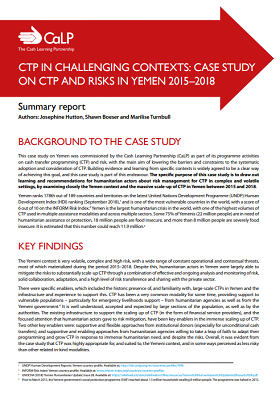
CTP in Challenging Contexts: Case Study on CTP and Risks in Yemen 2015–2018 – Summary
Report
Yemen is one of the most vulnerable countries in the world, and has long suffered from poverty, instability and vulnerability. The conflict, which has unravelled since late 2014, and, more specifically, since March 2015, has left 22 million Yemenis in need of some kind of humanitarian assistance or...

La Asistencia Alimentaria Basada en el Mercado en Guatemala: Una Sistematización de Experiencias
Guía y herramientas
En abril de 2017, a solicitud de la oficina de Alimentos para la Paz (FFP) de la Agencia Internacional de Desarollo de los Estados Unidos (USAID), Catholic Relief Services (CRS) y Project Concern International (PCI) en Guatemala diseñaron un proceso para recopilar y sintetizar las experiencias de...



